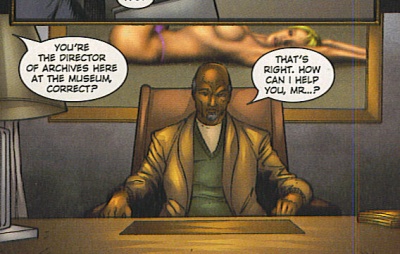
If you have any illusions of democracy and the sanctity of scholarship in the world of high profile literary manuscript collections, prepare to have them shattered by last Sunday’s NYT Book Review profile of Glenn Horowitz, alpha dog rare book and manuscripts dealer. Several repository heads and curators are interviewed in the article, including NYU’s Marvin Taylor, who comes right out and says “He inflated the market so much…it’s doing a disservice to scholarship.”
I’m bugged by the fact that the hype, fetishism, pursuit of prestige and big cash depicted in the article is fairly dead on, but also by firsthand experience dealing with the ramifications of this, as it sifts down through institutions, to repository staff, to researchers and students, and intellectual culture at large, and misshapes the public view of what constitutes “cultural materials”. So we end up with everyone’s granny knowing that Norman Mailer sold his papers to the HRC for millions of dollars, and grad students thinking they have to hop on a plane to go about serious research, never making the connection to what archives in our own communities are doing. It smacks of cultural hegemony, intellectual activity as separate from everyday life, and undue veneration of the same old, mostly white, mostly male giant-figure authors. As you’ll also notice in the profile, Horowitz has stray bits of valuable literary stuff lying around his apartment, making it clear that papers going on the market reach scholars only by luck.
It’s really hard for me to think of this perceived divide between special collections of the literary/high culture variety (those who collect, gasp! the objects of literature!) and everyone else in the archives/records business (those who deal with the papers of chemistry professors, churches, or garden clubs) as anything else besides a professional hazard. Imposed importance makes for real barriers on communication about very similar functions and minimally different materials. My friends who work with million dollar manuscripts have the same insights as those who work with less than glamorous collections. Moreso, it further alienates us from other branches of the library world, and I’m gonna say this again, is a nice distraction from the fact that most archivists and manuscripts librarians are really underpaid.
I recently read Janna Malamud Smith’s My Father is a Book, a biography of her father, novelist Bernard Malamud. Smith was motivated to write the book in part by dealing with the sale of her father’s papers, a deal which Horowitz brokered. It’s a really moving and incisive study on Malamud as represented by his papers. If you’re interested in documentation, this is an interesting exercise in context, meaning, and authenticity.



 Posted by Amelia Abreu
Posted by Amelia Abreu  Who would have guessed that Garfield would be more popular among the titles owned by OCLC libraries than, oh everything but the Bible, the Koran, and twelve other titles. Certainly not me. Read the whole fascinating list of the top 1000 titles
Who would have guessed that Garfield would be more popular among the titles owned by OCLC libraries than, oh everything but the Bible, the Koran, and twelve other titles. Certainly not me. Read the whole fascinating list of the top 1000 titles 


